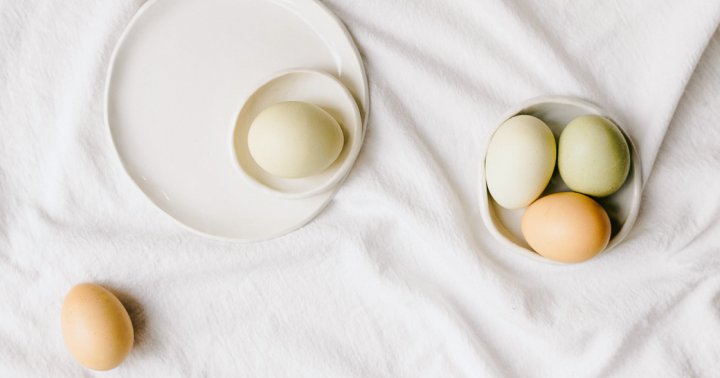Want To Up Your Daily Dose Of Biotin? 10 Foods To Add To Your Diet
There's something for everyone.

If you’ve spent any time in the supplement aisle at the market, you’ve probably seen biotin supplements. Sometimes they’re sold independently, and other times they’re included in multivitamin blends (especially prenatal vitamins, more on that later).
Most people living in developed countries with access to unprocessed foods get enough biotin through diet alone and frank deficiency is rare. That being said—knowing which foods contain biotin may help you map out your intake if you’re looking to up your daily dose.
Before we dive into which foods contain biotin, let’s establish what biotin is and why it’s important to ingest daily.
“Also known as vitamin B7, biotin plays a role in the conversion of food into energy in the body,” Amy Shapiro, M.S., R.D., RDN registered dietitian and founder of Real Nutrition says. “It plays an important role in keeping your skin, hair, eyes, liver, and nervous system healthy.”*
During pregnancy, getting enough of this nutrient becomes even more essential as it plays a role in embryonic development, Shapiro said.
According to Jessica Cording, M.S., R.D., CDN, the average adult needs 30 micrograms, or 0.03 milligrams, of biotin each day. Pregnant or lactating women, however, need 35 micrograms. These are the baseline daily levels (i.e., Recommended Dietary Allowance, RDA) issued by the National Academies.
Biotin is important for overall health, with functions ranging from blood sugar to beauty benefits.* For example, “it may help to normalize blood glucose levels,” Shapiro explains, a role that has been supported by preclinical research demonstrating this B vitamin’s ability to support pancreatic beta cell function and improve glucose tolerance.*
Additionally, there are many mechanisms to support the hair, skin, and nail benefits of getting adequate levels of this B vitamin, but more research is needed to expand our understanding in these areas of health.
However, its most notable role has to do with cellular energy production: Biotin is a coenzyme for carboxylases, or enzymes that help metabolize macronutrients.* Carboxylases are involved in the process of insulin release and gluconeogenesis, or the synthesis of glucose.
So it’s safe to say—getting enough biotin for whole-body health is important. Here, you’ll find a list of biotin-containing foods to consume that will help you hit your daily goal (keep in mind: some are richer sources than others).
Egg yolks are chock full of biotin. The average cooked egg yolk contains about 10 micrograms of biotin, which is equivalent to about 33% of the recommended daily intake of biotin for the average adult.
Not to mention, egg yolks are great for brain health as well. So if you’re looking to load up on nutrients in the morning, biotin included, cooked eggs are an easy go-to for breakfast.
According to Shapiro, certain nuts contain biotin as well. This includes almonds, pecans, walnuts, and peanuts. Don’t worry—nut butters count, too.
Nut butters are packed with protein and healthy fats as well, which makes them a great staple in a plant-based diet. Nut butters even make an appearance in longevity studies, particularly in the Mediterranean diet.
If you’re in the market for high-quality, delicious nut butters, check out this list.
Let’s be honest—organ meat isn’t for everyone and for others, these glandular organs make a regular appearance in their diet. That being said, they do have a significant amount of biotin in them. In fact, one 3-ounce serving of beef liver contains 103% of the amount of biotin you need daily.
If you've considered adding organ meats to your diet, check out this story to learn more about how to do so.
Sweet potatoes are a staple vegetable for so many reasons: They’re packed with beta-carotene, potassium, iron, vitamin B6, fiber, and of course, biotin.
You can easily incorporate sweet potatoes into your diet, as they have an adaptable flavor. You can roast chopped sweet potatoes and toss them into a salad or rice bowl to make it more satisfying or coat them in maple syrup and cinnamon for a sweet snack.
Speaking of adaptable foods, bananas also contain biotin. While they may not have as much as their other counterparts like organ meats and nut butters, the benefits of this fruit go far beyond their biotin content.
What’s more—You can eat bananas raw, which is important when we’re talking about biotin consumption.
“Cooking methods may break down biotin so eating some of these foods in their raw forms prove more bioavailable,” Shapiro said.
If there was a competition to find the perfect side dish, cauliflower would certainly be a finalist. This vegetable has a muted flavor, meaning you can make it fit your preferred taste.
The veggie doesn't contain a high amount of biotin, but as part of a larger, robust diet—it certainly has many benefits.
Looking for a cool summer snack? Dunk some raw cauliflower in your favorite healthy dip. In the market for a holiday side dish? Roast this vegetable in your go-to seasoning blend. Even pasta lovers can find something to love about this veggie, thanks to cauliflower gnocchi.
If you’re a fan of the Mediterranean diet, you’re likely very familiar with the nutritional benefits of salmon. But did you know that one 3 ounce serving of canned pink salmon contains 17% of the daily recommended biotin value?
This fish is filled with healthy fats; omega-3s to be specific. And when it comes to skin-loving foods, salmon just might come in first place.
For those who prefer a vegan or vegetarian diet, oats are another great plant-based option for some added biotin. What’s more, this is one of the few foods that just might be realistic to consume daily.
Oatmeal may sound boring on its own, but have you tried overnight oats before? What about baked oatmeal? There are countless ways to consume oats besides plain oatmeal, so have fun with it.
OK—At this point, I think we have a tasty biotin-rich vegetable medley: Cauliflower, mushrooms, and sweet potatoes. Toss 1-cup of fresh, chopped button mushrooms into your mix and you’ll be adding 19% of the daily recommended value of biotin to your meal.
You can sauté mushrooms, stuff them with other ingredients, or eat them raw as a salad topping.
Just ¼ cup of sunflower seeds contains 9% of the daily recommended value of biotin. These seeds are also packed with magnesium, which is good to know considering studies indicate that about 43% of Americans don't meet their daily baseline needs for magnesium.
These can be added to just about any meal for extra crunch and served seasoned and roasted or raw.
While most people living in developed countries with access to unprocessed foods can easily consume enough biotin as is, it doesn’t hurt to know where it’s coming from. If you are concerned about consuming enough biotin or seeking to leverage higher levels of the nutrient daily for key aspects of health, you may want to look for a high-quality supplement with biotin.

 MikeTyes
MikeTyes 































